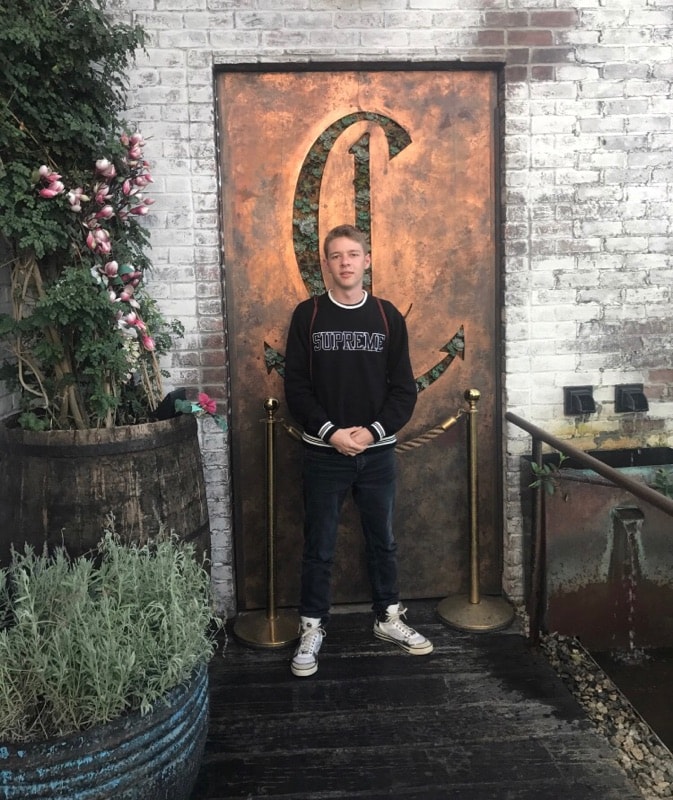.jpg)
Rowe Rowe is an 18-year-old rapper from Los Angeles, California. Themes of violence, sexism, and derogatory language often seem inherent to the genre that is rap music, and something that he didn’t believe should be the only topics, so he interpreted this as a calling for him to rebrand the rap genre as an art form. Every time he put on his headphones, he entered into another state, a vortex in which he found his harmony and voice. He resonated with the art form’s focus on “the struggle,” amid rappers’ motivation to find an escape and use such for empowerment. As a young child, he remembered turning the radio to the rap station, only for it to be instantly switched to another by his parents. After this, he always wondered what they were so afraid of. Rowe’s goal became to create music that had positive messages of triumph and joy. At eight, he wrote his first rhyme and played around with the Garage Band app. After writing a few songs, Rowe realized that he could use iTunes to publish his music, and at age twelve, his first single was released. The song, The Streets, gained immense popularity in the Calabasas area of Los Angeles, where he was attending middle school at the time, selling one hundred copies within the initial week. Subsequent weeks saw the number exponentially grow to one thousand copies sold. The word was out, the near release of the album Rowetropolis was sure to be an even greater success. This album has one of his top songs of all time, Cash in the Stash. He has worked with the likes of DJ Rupp, Tempo Stokes, Riley Urick, Mickey Shiloh, and Oneinthe4rest, among other big names in the music industry.
When Rowe Rowe was asked to reflect on his experience in the music industry, he stated: “Whenever I listened to my favorite rapper’s music, a common theme which emerged was that the only way to make it in this industry is to invest in your career. I decided to take all of the money I made from my first single and invest in promotion on iTunes. When sales came back extremely low, I was confused. I learned that all my friends were using free music services such as SoundCloud and Spotify. I was distraught; I had realized I lost of all my earnings. This was a time when I just wanted to quit, as my hope to spread my music seemed over.” In this, we can see how initial expectations gave way to disappointment, in a not dissimilar overture to how rap as a genre transformed from artists drawing on their life experiences to a glorification of a largely fantasy world of gangsters, crime, and drugs.
Rowe continues: “However, I did not allow myself to give up and decided to join the trend of releasing music via streaming services. I realized that I had fallen for what the greats of the industry said; I did not need to spend money on promotions because people were already listening. I put my music on SoundCloud and Spotify, and instantly people were sharing my music, and play numbers dramatically increased." This is a testament to hard work, and it is fine evidence that Rowe’s efforts were not only sincere to himself, but in his mission to reform the worse traits of the rap genre, and he knew that it was commercialization, other peoples’ ideas, and other peoples’ money that had transformed the genre, rather than the true nature of the music.
“The next step was to obtain a record deal. One day, I walked into a major record label in Los Angeles and asked to meet with a representative at the label. To my surprise, after showing the receptionist my music, she introduced me to an A&R, which I then sent my music to. She told me that she would get back to me if this was something the label was interested in. This whole situation is uncommon in the industry, as you usually have to have a manager and arrange a meeting, but the woman who I talked too heard something in my words. Two days later, I received an email stating they wanted to have a formal meeting. The next week, the person who I was supposed to have a meeting with told me that they loved my music, but the label wanted instant song sellers and “typical rap songs.” Rowe was heartbroken and realized that this is why the music industry is failing. The labels want to maintain status quo. The rap songs that work are lacking the essential innovation that separates a true artist from one who just wants to use the medium to make money. While that isn’t entirely unwarranted, it is nothing if not uncreative. And Rowe’s subsequent numbers reflect the alternate venues now available, as proof of both the changing face of music distribution and the disparate nature of artists and their motivations in making music: “To this date, I have over four million plays in total on SoundCloud, 80,000 streams on Spotify, 20,000 followers on Instagram, worked with producers and have gotten invited to recording studios that have done work for Kanye West, Chris Brown, Lady Gaga, and found a way to continue making music and releasing it out to the world.” Shine on, you inspired trendsetter.
https://www.rowerowemusic.com
Instagram: https://www.instagram.com/roweroweofficial/
Twitter: https://twitter.com/rowerowemusic